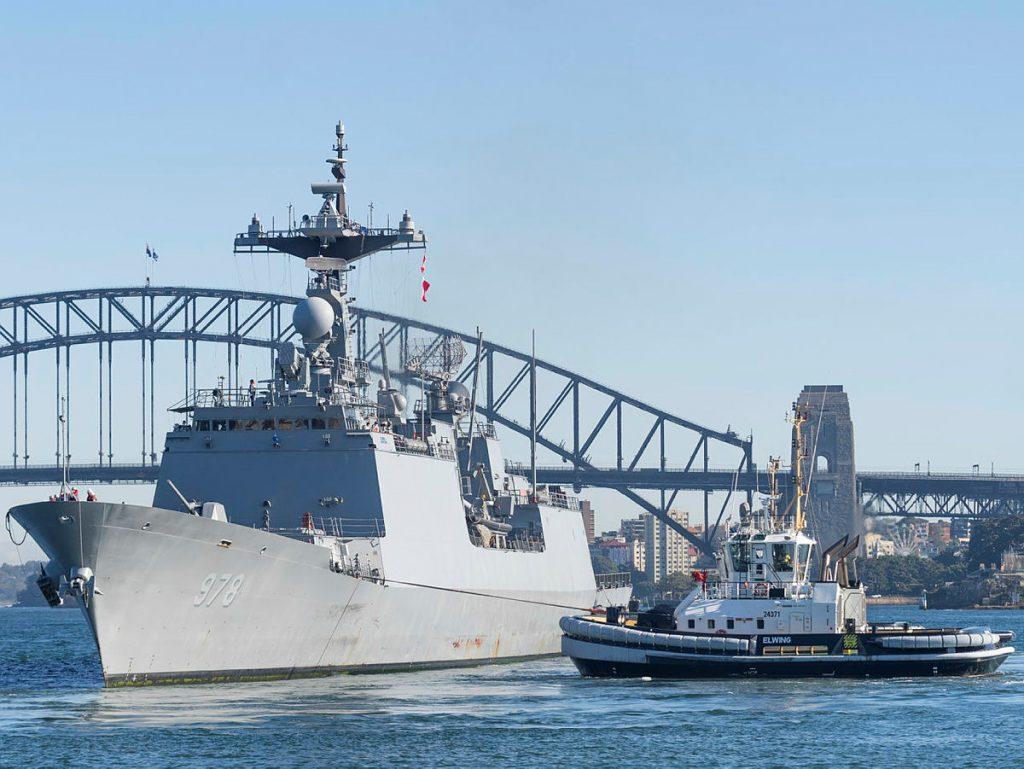
Sea state
Warships from the US, Japanese and South Korean navies are in Sydney to take part in the annual Exercise Pacific Vanguard. Their visits to Garden Island Naval Base are subject to strict counter-Covid precautions and shore leave is not permitted. The crews from USS Rafael Peralta, JS Makinami, ROKS Wang Geon and Australia’s Hobart-class guided missile destroyer HMAS Brisbane will build their cooperative seamanship and warfighting skills during the exercise.
Egyptian President Abdel Fattah el-Sisi has opened his country’s fourth Mediterranean naval base in Gargoub, 255 kilometres west of Alexandria and near the Libyan border. The inauguration was attended by leaders of both the United Arab Emirates and Libya in a sign of the warming diplomatic ties among these nations since Libya came under a new administration. Egyptian media says the new base includes an airstrip and will support the country’s military modernisation in the region. Egypt says it is strategically positioned to secure shipping lines to the nation’s north and northwest.
Flight path
A Philippine Air Force C-130 Hercules transport aircraft crashed after missing the runway at Jolo airport in the country’s south, killing 52 people, including three civilians on the ground. Forty-nine of the 96 soldiers and crew it carried were killed in the crash on 4 July and the remainder were injured in the Philippine military’s worst-ever air disaster. The soldiers were on their way to join counterterrorism operations against Islamist separatist group Abu Sayyaf. Philippine Defense Secretary Delfin Lorenzana has ordered an investigation into the crash.
Chinese state-run media outlet the Global Times reports that the People’s Liberation Army Air Force is using artificial intelligence to train pilots in aerial combat. It says Chinese pilots are matching wits with AI systems to improve the pilots’ decision-making and combat skills and ‘training’ the AI systems, which may to be integrated into future warplanes. While it’s not clear how much progress China has made with airborne AI, its integration is at the forefront of military developments and a key to human–machine teaming in future air combat.
Rapid fire
The Australian Defence Force has suspended operations of its MRH-90 Taipan helicopters due to safety concerns. The ADF has released little information other than confirmation that the issues relate to the aircraft’s maintenance. This isn’t the first time Taipans have been grounded. The manufacturer, Airbus, and the ADF are collaborating to resolve the problems; meanwhile, the ADF’s other helicopters, including Tigers, Chinooks, Black Hawks and Seahawks, are operating normally.
South Korean defence company Hanwha Defense says the Republic of Korea Army will next year trial the Hanwha AS21 Redback infantry fighting vehicle, which is one of two contenders in phase 3 of the Australian Army’s Land 400 project. The Redback will be tested by an ROK Army mechanised unit.
Final frontier
Mary Wallace ‘Wally’ Funk, a veteran pilot now 82, is set to fly to space as Jeff Bezos’s ‘honoured guest’ on his spacecraft New Shepard. Funk was the youngest graduate of NASA’s ‘Mercury 13’ Women in Space program in the 1960s. The program was later cancelled when NASA deemed women unfit for space travel, even though they’d outperformed their male counterparts in key aspects of their training. Now Funk is set to become the world’s oldest space traveller on New Shepard’s first flight carrying people. Take-off is scheduled for 20 July, the anniversary of the Apollo 11 moon landing.
Two Chinese astronauts exhibited their country’s first indigenous space suit for nearly seven hours during a spacewalk on Sunday when they installed parts of China’s Tiangong space station. Alongside prototype helmet cameras, the Feitian (literally, ‘Fly to Sky’) suits sport what its makers say is an innovative design with decorative ribbons and a ‘slimming’ visual finish. The three-month mission, China’s first crewed space flight in five years, is an important step in its ambitious space program.
Wired watchtower
A ransomware attack on US-based IT company Kaseya could impact up to 1,500 businesses. Last Friday, hackers successfully disabled Kaseya’s customer IT systems on five continents, forcing hundreds of supermarket closures in Sweden and knocking New Zealand schools and day-care facilities offline. Increasing ransomware attacks on US firms, including Microsoft Exchange, SolarWinds and Colonial Pipeline, have exposed major vulnerabilities in US cybersecurity. In response, the Biden administration has made sweeping reforms to cybersecurity standards, established a cybersecurity taskforce and appointed the first national cyber director.
On Monday, the Cyberspace Administration of China (CAC) announced investigations into two US-listed Chinese companies, Full Truck Alliance and Kanzhun, citing potential risks to national data and security. These inquiries follow a similar CAC probe into popular ride-hailing app Didi a day earlier. The CAC’s cybersecurity review appears to be retaliation for the US’s designation of five Chinese technology companies as national security risks in March. But it also demonstrates China’s concerns about tech giants’ growing power.